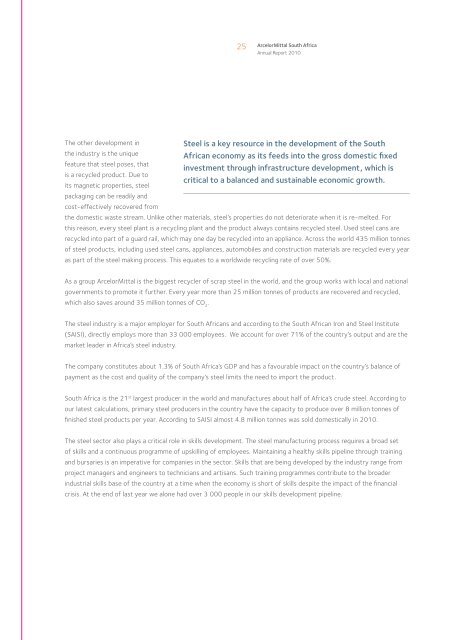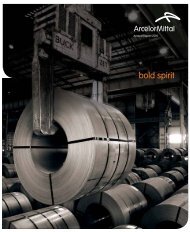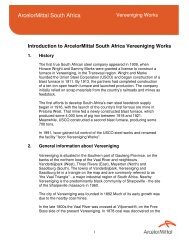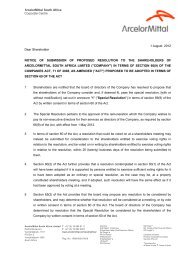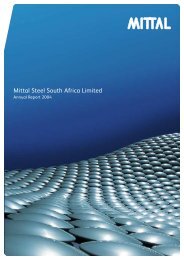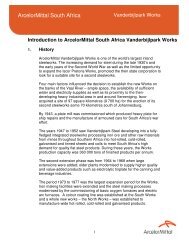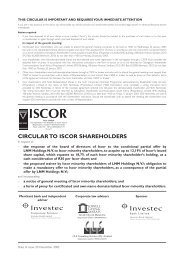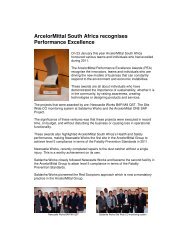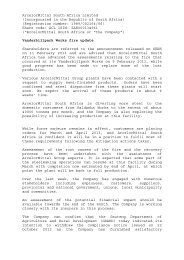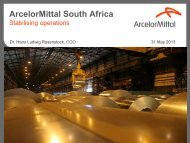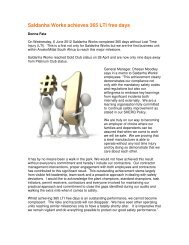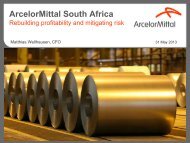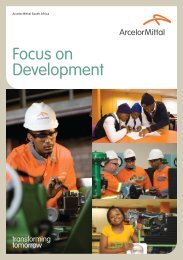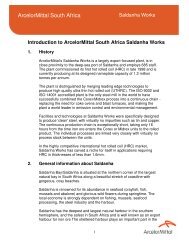bold spirit - ArcelorMittal South Africa
bold spirit - ArcelorMittal South Africa
bold spirit - ArcelorMittal South Africa
You also want an ePaper? Increase the reach of your titles
YUMPU automatically turns print PDFs into web optimized ePapers that Google loves.
25<br />
<strong>ArcelorMittal</strong> <strong>South</strong> <strong>Africa</strong><br />
Annual Report 2010<br />
The other development in<br />
Steel is a key resource in the development of the <strong>South</strong><br />
the industry is the unique<br />
<strong>Africa</strong>n economy as its feeds into the gross domestic fixed<br />
feature that steel poses, that<br />
investment through infrastructure development, which is<br />
is a recycled product. Due to<br />
critical to a balanced and sustainable economic growth.<br />
its magnetic properties, steel<br />
packaging can be readily and<br />
cost-effectively recovered from<br />
the domestic waste stream. Unlike other materials, steel’s properties do not deteriorate when it is re-melted. For<br />
this reason, every steel plant is a recycling plant and the product always contains recycled steel. Used steel cans are<br />
recycled into part of a guard rail, which may one day be recycled into an appliance. Across the world 435 million tonnes<br />
of steel products, including used steel cans, appliances, automobiles and construction materials are recycled every year<br />
as part of the steel making process. This equates to a worldwide recycling rate of over 50%.<br />
As a group <strong>ArcelorMittal</strong> is the biggest recycler of scrap steel in the world, and the group works with local and national<br />
governments to promote it further. Every year more than 25 million tonnes of products are recovered and recycled,<br />
which also saves around 35 million tonnes of CO 2<br />
.<br />
The steel industry is a major employer for <strong>South</strong> <strong>Africa</strong>ns and according to the <strong>South</strong> <strong>Africa</strong>n Iron and Steel Institute<br />
(SAISI), directly employs more than 33 000 employees. We account for over 71% of the country’s output and are the<br />
market leader in <strong>Africa</strong>’s steel industry.<br />
The company constitutes about 1.3% of <strong>South</strong> <strong>Africa</strong>’s GDP and has a favourable impact on the country’s balance of<br />
payment as the cost and quality of the company’s steel limits the need to import the product.<br />
<strong>South</strong> <strong>Africa</strong> is the 21 st largest producer in the world and manufactures about half of <strong>Africa</strong>’s crude steel. According to<br />
our latest calculations, primary steel producers in the country have the capacity to produce over 8 million tonnes of<br />
finished steel products per year. According to SAISI almost 4.8 million tonnes was sold domestically in 2010.<br />
The steel sector also plays a critical role in skills development. The steel manufacturing process requires a broad set<br />
of skills and a continuous programme of upskilling of employees. Maintaining a healthy skills pipeline through training<br />
and bursaries is an imperative for companies in the sector. Skills that are being developed by the industry range from<br />
project managers and engineers to technicians and artisans. Such training programmes contribute to the broader<br />
industrial skills base of the country at a time when the economy is short of skills despite the impact of the financial<br />
crisis. At the end of last year we alone had over 3 000 people in our skills development pipeline.


